Campus News and Ideas Food Insecurity Helping the Hungry: Campus Food Pantries Can Be Lifesavers for Struggling Students. But Are Colleges and Universities Doing Enough? 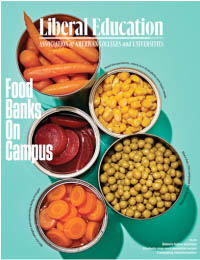 Soon after Greenfield Community College opened its food pantry in 2012, Jan Ross welcomed a student in need. The new pantry wasn’t big—about thirty feet long and twelve feet wide—but as Ross discussed the application process, she quickly knew it would change the student’s life. Soon after Greenfield Community College opened its food pantry in 2012, Jan Ross welcomed a student in need. The new pantry wasn’t big—about thirty feet long and twelve feet wide—but as Ross discussed the application process, she quickly knew it would change the student’s life.
“You don’t know how much this is going to help me,” the student told Ross, a pantry volunteer and administrative assistant to the dean of humanities at the roughly three thousand–student Massachusetts college. “I have two children. And the other day when we were at the store, all my daughter wanted for her birthday was for me to make her brownies. And I had to say no, because we couldn’t afford to buy the brownie mix and still get enough food to feed us.” Ross turned and pointed to a brownie mix box on the shelf. “She looked at me, and I looked at her, and the two of us stood there and cried,” Ross says. “And I said, ‘Now your daughter can have her birthday brownie.’ ” Eight years later, that moment still fuels Ross’s passion for the pantry, which provides about nine thousand pounds of supplies a year to roughly 100 to 120 students. The goods include not only food but personal-care items, from shampoo and laundry detergent to diapers—“all of those things you can’t use food stamps for,” Ross says. Read more Innovating New Ways To Tackle Food Insecurity for Students – Single Stop, Seahawk Marketplace, and more: A Q&A with Broward College President Gregory Haile 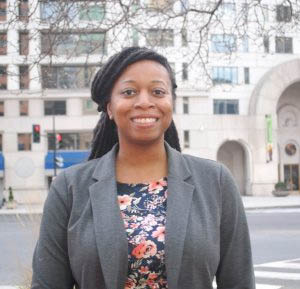 With COVID still persisting on a national and global scale, already existing issues have been exacerbated by this ongoing pandemic, particularly with food-insecure students. Countless students are currently feeling a rise in the pressures of food insecurity, leading Broward College President Gregory Adam Haile to innovate a series of solutions that tackle student hunger effectively and equitably. Join Sara Weissman and President Haile in this Q&A session where we dive deep into the different approaches taken to solving food insecurity among college students. They discuss the impacts and implementations of strategies such as Single Stop, Seahawk Marketplace, and nutrition courses. With COVID still persisting on a national and global scale, already existing issues have been exacerbated by this ongoing pandemic, particularly with food-insecure students. Countless students are currently feeling a rise in the pressures of food insecurity, leading Broward College President Gregory Adam Haile to innovate a series of solutions that tackle student hunger effectively and equitably. Join Sara Weissman and President Haile in this Q&A session where we dive deep into the different approaches taken to solving food insecurity among college students. They discuss the impacts and implementations of strategies such as Single Stop, Seahawk Marketplace, and nutrition courses. KEY POINTS / MAIN TAKEAWAYS: - How food insecurity has impacted Broward college students.
- What is Seahawk Marketplace and how will it help food-insecure students?
- How Single Stop simplifies support for students.
- How can we ensure long-term security for food-insecure students?
- The impacts of hunger and nutrition on student retention.
- Advice for other schools and leaders for combating food insecurity.
Report Details COVID-19’s Massive Impact on Student Food Insecurity. Read more RCC Food Features Planting Seeds of Food Sovereignty Through Gardening | RCC Fellow Elise Dudley | TEDxFurmanU 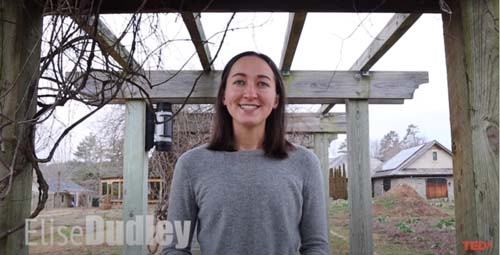 Elise Dudley is a senior sustainability major with a focus on food justice issues. During her time at Furman, she has worked, lived, and volunteered on numerous farms, devoted time to projects addressing poverty and food insecurity, and completed coursework in Denmark on sustainable food production and consumption. Elise currently is a fellow for the Rachel Carson Council and is completing her undergraduate thesis and research on leveraging backyard gardening as a path towards more resilient foodscapes. Elise’s talk describes a clear vision for the future, where home gardening and local food production can help the planet, people, and reignite our connection to food. Click here to watch Elise Dudley is a senior sustainability major with a focus on food justice issues. During her time at Furman, she has worked, lived, and volunteered on numerous farms, devoted time to projects addressing poverty and food insecurity, and completed coursework in Denmark on sustainable food production and consumption. Elise currently is a fellow for the Rachel Carson Council and is completing her undergraduate thesis and research on leveraging backyard gardening as a path towards more resilient foodscapes. Elise’s talk describes a clear vision for the future, where home gardening and local food production can help the planet, people, and reignite our connection to food. Click here to watch The Real Steaks, A Rachel Carson Council Podcast  In The Real Steaks, RCC Fellow Emma Chervek, a senior at Central College and an Iowa native, Emma Chervek looks at Iowa's agriculture industry through an environmental health and justice lens, focusing on the negative environmental effects of industrial agriculture, Iowa's meatpacking plants, and the rise of sustainable and regenerative agriculture. Special guests include Dr. Kristy Nabhan-Warren, Representative Timi Brown-Powers, leaders from various environmental nonprofits, and Iowa's sustainably minded farmers. If you're curious about how our current system of agriculture affects our environment, our communities, and the steps we can take to move towards a better future, give this podcast a listen. Listen to Episode 1 of The Real Steaks now In The Real Steaks, RCC Fellow Emma Chervek, a senior at Central College and an Iowa native, Emma Chervek looks at Iowa's agriculture industry through an environmental health and justice lens, focusing on the negative environmental effects of industrial agriculture, Iowa's meatpacking plants, and the rise of sustainable and regenerative agriculture. Special guests include Dr. Kristy Nabhan-Warren, Representative Timi Brown-Powers, leaders from various environmental nonprofits, and Iowa's sustainably minded farmers. If you're curious about how our current system of agriculture affects our environment, our communities, and the steps we can take to move towards a better future, give this podcast a listen. Listen to Episode 1 of The Real Steaks now Divestment • Reinvestment U North Carolina Asheville Signs Carbon Commitment 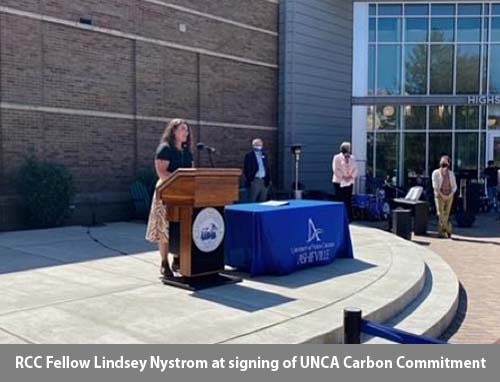 Chancellor Cable signed the Carbon Commitment promising UNC Asheville’s campus to be carbon neutral by 2050 at a Greenfest event on March 30. Chancellor Cable signed the Carbon Commitment promising UNC Asheville’s campus to be carbon neutral by 2050 at a Greenfest event on March 30.
“We have a lot of work to do, but we will do that work over these number of years,” Cable said at the event. The chancellor said UNCA now is one of 400 colleges and universities in the United States who have pledged carbon neutrality by 2050, joining the 10 percent of U.S. universities who have signed the commitment. “Today’s action, rooted in our values of sustainability and environmental stewardship means that we will build on the student generated action plan for climate and we will take the steps necessary in the coming years to be carbon neutral,” Cable said. The chancellor said the university received over 50 individual letters from students in support of UNCA signing the Carbon Commitment. UNCA junior and environmental equity major Lindsay Nystrom spoke at the event and said for the past year she has helped push the movement to sign the Carbon Commitment and developed a climate action plan with a small group in her climate change class last spring. Read more How Persistent Student Organizing Forced One of the Largest Public Universities to Divest From Fossil Fuels 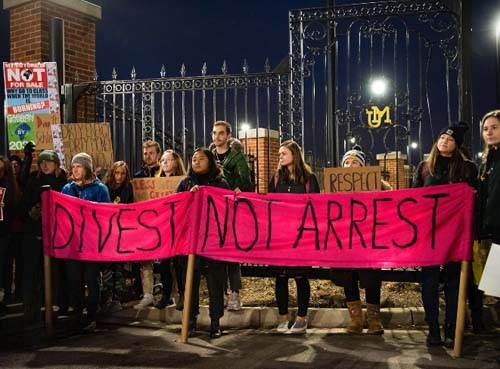 Over eight years, University of Michigan students led bold direct actions, continually recruited new students and forged ties with regents to keep $1 billion from the fossil fuel industry. Over eight years, University of Michigan students led bold direct actions, continually recruited new students and forged ties with regents to keep $1 billion from the fossil fuel industry.
Last month, the University of Michigan became the latest to accept the obvious — that investing in the destruction of society is fundamentally counter to the mission of higher education. With its endowment of $14.2 billion, Michigan now becomes one of the largest public universities to commit to divesting from fossil fuels. I couldn’t have imagined writing that sentence only two years ago, when I watched as 10 of my peers were escorted out of the university’s central administration building in handcuffs after an exhausting eight-hour sit-in. But as many other student divestment campaigns have learned, organizing — with some strategic direct action — eventually pays off. Read more RCC Fellows on Divestment Divesting for Change: From Apartheid to the Climate Crisis  As a fossil fuel divestment activist at Vanderbilt University, I come from a long generation of divestment advocates before me. For instance, fossil fuel divestiture has clear parallels to the anti-apartheid divestment movement of the 1980s, which, like fossil fuel divestiture, had “a well-defined, immediate objective” that targeted higher education institutions. Apartheid divestiture was an integral component of toppling the oppressive South African governmental regime and, other than fossil fuels, is the best-known divestment movement. However, there have been multiple waves of divestment protests that took on a myriad of issues. In the 1990’s students urged their higher education institutions to divest from the tobacco industry because of smoking’s harmful health effects. More broadly, there are divestment campaigns associated with specific countries involved in genocide, weapons manufacturing, private prisons, and the Israeli occupation of Palestine. As a fossil fuel divestment activist at Vanderbilt University, I come from a long generation of divestment advocates before me. For instance, fossil fuel divestiture has clear parallels to the anti-apartheid divestment movement of the 1980s, which, like fossil fuel divestiture, had “a well-defined, immediate objective” that targeted higher education institutions. Apartheid divestiture was an integral component of toppling the oppressive South African governmental regime and, other than fossil fuels, is the best-known divestment movement. However, there have been multiple waves of divestment protests that took on a myriad of issues. In the 1990’s students urged their higher education institutions to divest from the tobacco industry because of smoking’s harmful health effects. More broadly, there are divestment campaigns associated with specific countries involved in genocide, weapons manufacturing, private prisons, and the Israeli occupation of Palestine. Although fossil-fuel campaigns are similar to other divestment campaigns, there are also significant differences – advocates of divestment demand the reduction of investments in a massive and influential industry whose existence seemingly underpins a large portion of the global economy. That’s why the implications of divestment from fossil fuels seems more complicated than other previous campaigns and is best compared to tobacco divestment since it is “the companies’ fundamental business, rather than their particular decisions” that predicate why activists are urging divestment. Read more ‘They Love to Tout They’re Green’: Pushing for University Action on Climate Change 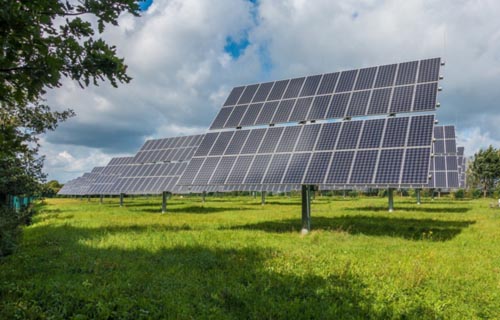 Colleges and universities are massive hubs of education, research, and innovation. As more and more data on climate change is produced by faculty and students at the world’s leading universities, the college campus has been transformed into a sustainability mecca. Facilities upgrades in the form of recycling and composting operations, HVAC-system repairs, and renewable energy projects on college campuses continue to make national news. Just recently, Penn State partnered with Lightsource bp to supply almost 25% of the University’s state-wide electricity needs, thereby reducing the University’s overall greenhouse gas emissions by 57,000 metric tons of CO2e per year. Projects such as these exemplify the facilities changes that colleges and universities are willing to invest in for the future. Colleges and universities are massive hubs of education, research, and innovation. As more and more data on climate change is produced by faculty and students at the world’s leading universities, the college campus has been transformed into a sustainability mecca. Facilities upgrades in the form of recycling and composting operations, HVAC-system repairs, and renewable energy projects on college campuses continue to make national news. Just recently, Penn State partnered with Lightsource bp to supply almost 25% of the University’s state-wide electricity needs, thereby reducing the University’s overall greenhouse gas emissions by 57,000 metric tons of CO2e per year. Projects such as these exemplify the facilities changes that colleges and universities are willing to invest in for the future. Students are often bombarded with a variety of options on campus to engage with sustainability as well. From reusable take-out containers available in dining halls to siloed research opportunities assessing the potential energy savings of switching to LED light bulbs in on-campus buildings, sustainability is directly embedded within the college experience. As climate change has become a well-known phenomenon and issue in recent decades, coursework on causes, consequences, and solutions has become more mainstream, with students at various universities across the United States exposed to climate change concepts in some capacity. Read more More on Divestment 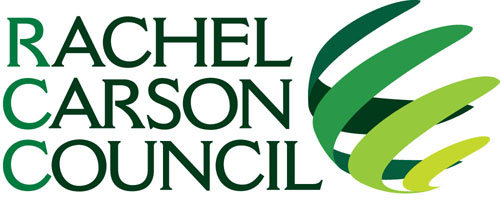 RCC Announces New Divestment Campaign and Report  Building on work from members of our RCC Fellowship Program and through our national Campus Network, the Rachel Carson Council is has launched our latest campaign and an upcoming report: Money Talks: Successful Strategy for the Movement from Fossil Fuels to Investment in Renewables. Building on work from members of our RCC Fellowship Program and through our national Campus Network, the Rachel Carson Council is has launched our latest campaign and an upcoming report: Money Talks: Successful Strategy for the Movement from Fossil Fuels to Investment in Renewables. As an organizing tool, divestment has served social movements for decades. In the fight against the climate crisis, divestment campaigns have become a central tool for students to press their institutions on their climate commitments, as well as businesses and state funds to divest from fossil fuels. In our new report, RCC will make the case that not only must we divest from the fossil fuel industry, but that we must also reinvest into a future fueled by renewable energy. In this effort, we will provide student organizers with the tools to organize successful campaigns, understand the complexities of university endowments, other financial instruments and holdings, and how best to reinvest in a sustainable future. U Pennsylvania Announces Zero GHG Emissions From Investments 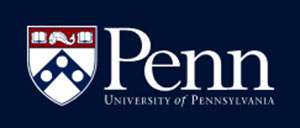 Combatting climate change is one of the paramount challenges of our time. We write today to update the University community on a significant new initiative that Penn is undertaking as part of our deep and wide-ranging efforts to respond to climate change. We are pleased to announce that the Office of Investments has established the goal of reducing the net greenhouse gas emissions from Penn’s endowment investments to zero by 2050. Combatting climate change is one of the paramount challenges of our time. We write today to update the University community on a significant new initiative that Penn is undertaking as part of our deep and wide-ranging efforts to respond to climate change. We are pleased to announce that the Office of Investments has established the goal of reducing the net greenhouse gas emissions from Penn’s endowment investments to zero by 2050. This important step builds upon Penn’s longstanding commitment to achieve carbon neutrality across the University’s operations and upon the previous decision by the Office of Investments to factor the assumption of a decarbonizing economy into investment decision-making. It also adds to Penn’s earlier affirmation of the absence of direct holdings of thermal coal and tar sands, and our commitment to continue that position going forward. The Office of Investments’ new goal supports the aim of the 2015 Paris Agreement and the UN’s Intergovernmental Panel on Climate Change of reducing the world’s net anthropogenic emissions to zero by 2050 in order to limit the global warming increase to 1.5°C from pre-industrial levels. Read more How Banks Finance the Climate Crisis 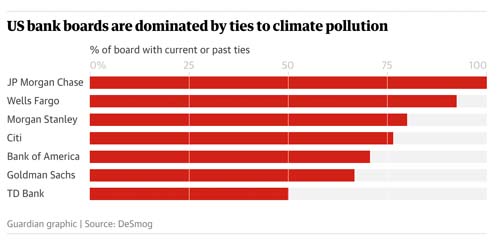 Today’s newsletter is a collaboration with Emily Holden at Floodlight, a new non-profit news organization dedicated to investigating the corporate and ideological interests holding back climate action. ICYMI, we ran an interview with Holden about Floodlight’s launch last month. Today’s newsletter is a collaboration with Emily Holden at Floodlight, a new non-profit news organization dedicated to investigating the corporate and ideological interests holding back climate action. ICYMI, we ran an interview with Holden about Floodlight’s launch last month. Our article today investigates how decision-makers at major banks have conflicts of interest on climate, and what that means for the projects they back—like Line 3 in Northern Minnesota. It is also running in The Guardian. At the top of today’s e-mail, you’ll also find a behind-the-scenes, podcast-style audio interview about this story. It starts with a discussion between Emily and I, and then ends with an interview with Giniw Collective founder Tara Houska, who’s been leading direct actions against the Line 3 pipeline. I hope you enjoy this collaboration! Let me know what you think in the comments, and please consider supporting this 100 percent reader-funded, independent journalism with a subscription if you can. Read more Civic Engagement State by State: Youth Voter Turnout in 2020 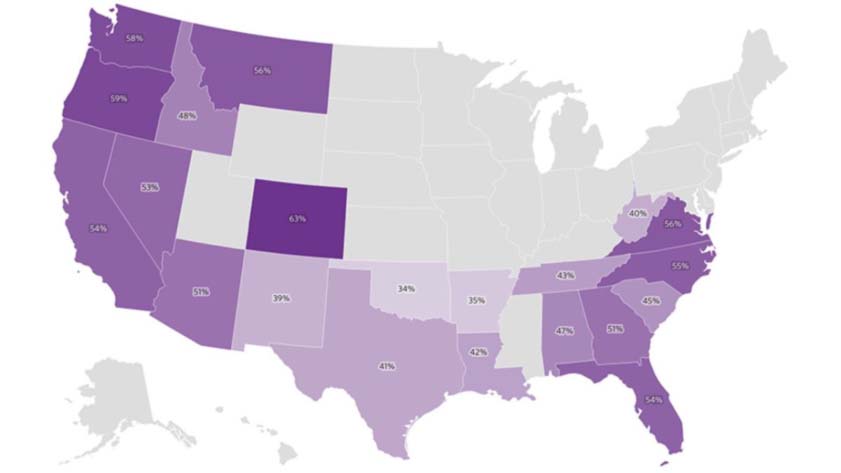 Electoral participation ranged from 39% to 63% in this region, where many states tried to facilitate voting by mail in 2020. Electoral participation ranged from 39% to 63% in this region, where many states tried to facilitate voting by mail in 2020.
Shortly after the 2020 presidential election, CIRCLE used the immediately available exit polls and AP VoteCast survey data to estimate that turnout of young voters (ages 18-29) was between 53-56%, a major increase from 2016 and a likely historic level of youth or voter participation. Now that the states are updating their voter rolls, we are able to get a more granular, state-by-state view of youth turnout based on official election data. This is important: each state has its own election laws and policies, community conditions, and potential barriers that shape whether youth vote; seeing where turnout is high or low can point to what is or isn't working to expand the youth electorate. We’re starting our analysis with a look at the West and Southwest, including key 2020 battleground states like Arizona and Nevada, and we’ll release data on additional regions in the coming days and weeks. As we think about state-by-state youth turnout, it’s important to keep in mind the national context. According to the United States Elections Project, nationally, among all voters, turnout increased 7 percentage points between 2016 and 2020 and was at its highest level since 1900. Read more Elsewhere on Campus Misericordia University Adds Growing Field of Environmental Studies to Academic Programming 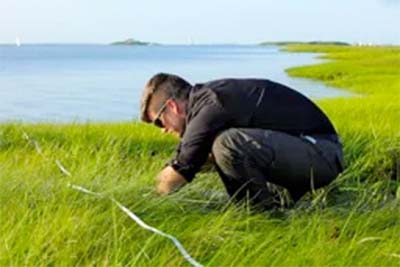 Misericordia University has announced the addition of Environmental Studies to its list of academic programming for Fall 2021, which offers new academic opportunities with a range a professional applications. Misericordia University has announced the addition of Environmental Studies to its list of academic programming for Fall 2021, which offers new academic opportunities with a range a professional applications.
“A National Endowment for the Humanities grant enabled Misericordia University to develop major and minor programs in Environmental Studies that emphasize interdisciplinary collaboration and community-based learning,” said Melanie Shepherd, Ph.D., Professor of Philosophy and Chair of the Department of Philosophy, Misericordia University. “This increasingly popular area of study complements a growing number of jobs covering a wide cross-section of industries.” There are currently more than 370,000 Environmental Studies majors in the United States work force, earning an average salary of $68,265. Such professional fields include environmental science; environmental law; environmental policy, planning, and management; and environmental advocacy, as well as middle and secondary education. Read more At U of Maryland, Building Names Have Become More Meaningful 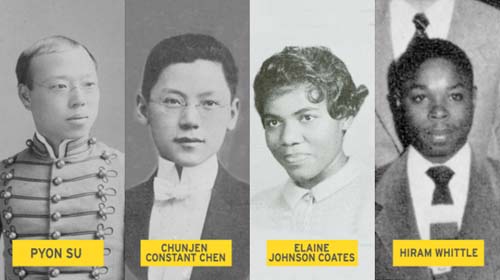 University of Maryland administrators are acknowledging history and promoting inclusivity by naming new buildings for barrier-breaking alumni of color. University of Maryland administrators are acknowledging history and promoting inclusivity by naming new buildings for barrier-breaking alumni of color.
The founding and early history of the University of Maryland at College Park are steeped in racism and slavery -- a legacy of many land-grant institutions in the United States that is becoming more widely known and openly discussed. But students, faculty and staff members at the college have also recently been confronting the ongoing and modern threat of white supremacy. The campus was shaken in 2017, when Sean Urbanski, a white UMD student, murdered Richard Collins III, a Black Bowie State University student and lieutenant in the U.S. Army who was visiting a friend who attended the university. Urbanski was sentenced to life in prison last month, and many believe racial animus played a central role in the killing; Urbanski belonged to a white supremacist Facebook group, The Washington Post reported. Read more Gonzaga University Launches Center for Climate Society and the Environment 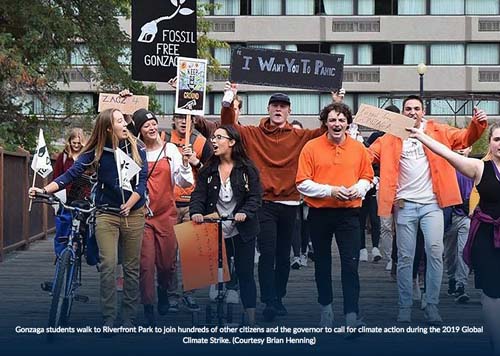 Gonzaga University is celebrating the 51st Annual Earth Day on April 22 by launching the new Gonzaga Center for Climate, Society and the Environment and an event featuring some of the nation’s top thought-leaders on climate change and solutions. Gonzaga University is celebrating the 51st Annual Earth Day on April 22 by launching the new Gonzaga Center for Climate, Society and the Environment and an event featuring some of the nation’s top thought-leaders on climate change and solutions.
Washington Gov. Jay Inslee; Bill McKibben, founder of the international climate action movement 350.org; and Keya Chatterjee, executive director of the U.S. Climate Action Network will participate in a panel discussion that’s free and open to all. The live-streamed discussion begins at 3:30 p.m. Registration is required at bit.ly/GonzagaClimate. An expression of Gonzaga’s Catholic, Jesuit and humanistic tradition, the Climate Center will provide resources and opportunities to meet the unprecedented challenges facing humanity and the wider natural environment in the 21st century. This new interdisciplinary academic center will serve Gonzaga students and our region by advancing innovative, interdisciplinary scholarship, teaching, consulting, and capacity-building. Brian G. Henning, Ph.D., chair and professor of environmental studies and professor of philosophy at Gonzaga, will serve as the founding director of the new center. Read more Forest Preservation at St. Thomas U. 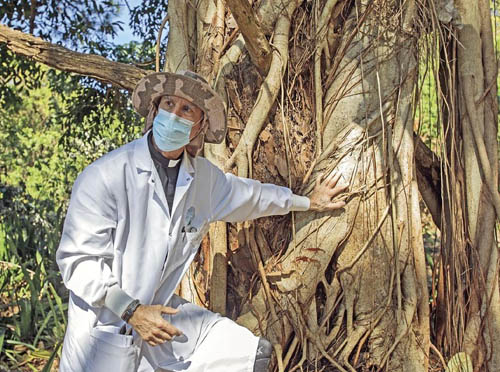 Bioethics Professor Leads Restoration of Miami’s Last Remaining Sandy Highland Pine Forest. Bioethics Professor Leads Restoration of Miami’s Last Remaining Sandy Highland Pine Forest.
Every afternoon at St. Thomas University, Father Alfred Cioffi, joined by students, methodically clears out invasive species from Miami-Dade County’s last remaining sandy highland slash pine forest. And as he removes Brazilian pepper trees and other invaders, the associate professor of biology and bioethics hears the quiet cries for “help” and whispers of “thank you” from the canopy’s towering pillars. Indeed, he is doing God’s work, caring for creation, considering a January BBC report that a tropical forest the size of Denmark disappears yearly. Florida was covered in pines until developers plowed southward, and St. Thomas’ entire 140-acre campus comprised a sandy highland slash pine forest before its establishment in 1961. Read more Rachel Carson Still Inspires Undergraduate Women Today Revolutionary Environmental Activism: Rachel Carson, Wangari Maathai, and Greta Thunberg 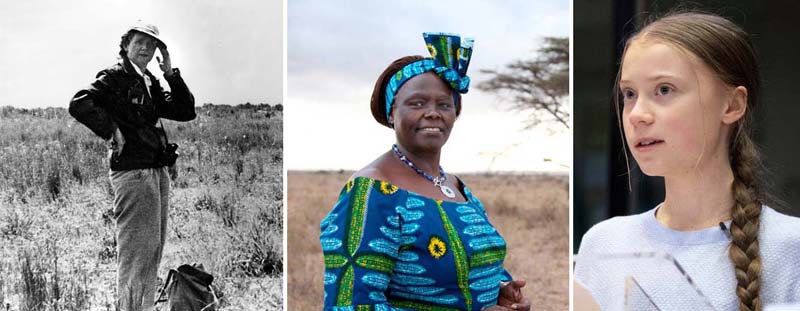 The environmental revolution is perhaps the most important fight in which humanity has participated. Humans need clean air and water, access to natural resources, and a stable climate to survive, making environmentalism a movement that affects every person on Earth. Ever since the Industrial Revolution, when carbon emissions began to grow exponentially, individuals have expressed their concerns regarding destructive human activity to their governments. Importantly, many of those individuals have been women. Despite some of the limitations imposed on them due to their age, nationality, and/or education, women all over the world have spearheaded environmental movements and inspired others to do the same. In the modern environmental revolution, three women have had a profound impact in their home countries and on an international scale; Rachel Carson, Wangari Maathai, and Greta Thunberg have each witnessed environmental degradation and injustice and taken meaningful action against it. Resultantly, these three women catalyzed global, citizen-led environmental movements. Carson, Maathai, and Thunberg demand action that is necessary for global human survival and ecological health, making them a few of the most important women in environmental history. Read more The environmental revolution is perhaps the most important fight in which humanity has participated. Humans need clean air and water, access to natural resources, and a stable climate to survive, making environmentalism a movement that affects every person on Earth. Ever since the Industrial Revolution, when carbon emissions began to grow exponentially, individuals have expressed their concerns regarding destructive human activity to their governments. Importantly, many of those individuals have been women. Despite some of the limitations imposed on them due to their age, nationality, and/or education, women all over the world have spearheaded environmental movements and inspired others to do the same. In the modern environmental revolution, three women have had a profound impact in their home countries and on an international scale; Rachel Carson, Wangari Maathai, and Greta Thunberg have each witnessed environmental degradation and injustice and taken meaningful action against it. Resultantly, these three women catalyzed global, citizen-led environmental movements. Carson, Maathai, and Thunberg demand action that is necessary for global human survival and ecological health, making them a few of the most important women in environmental history. Read more |